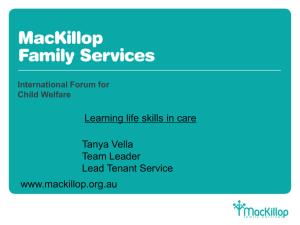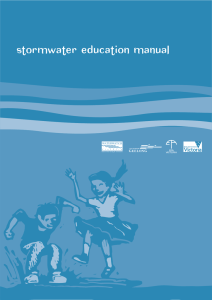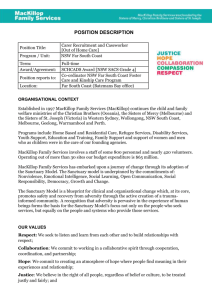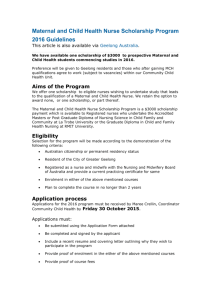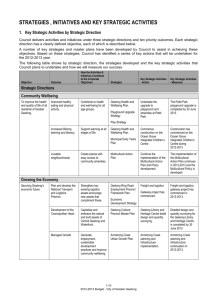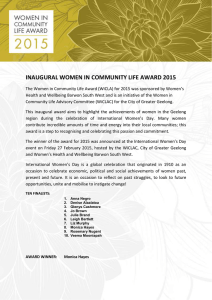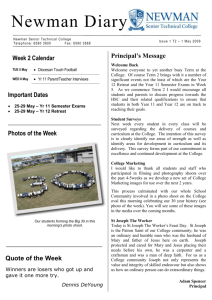MacKillop Education - International Forum for Child Welfare
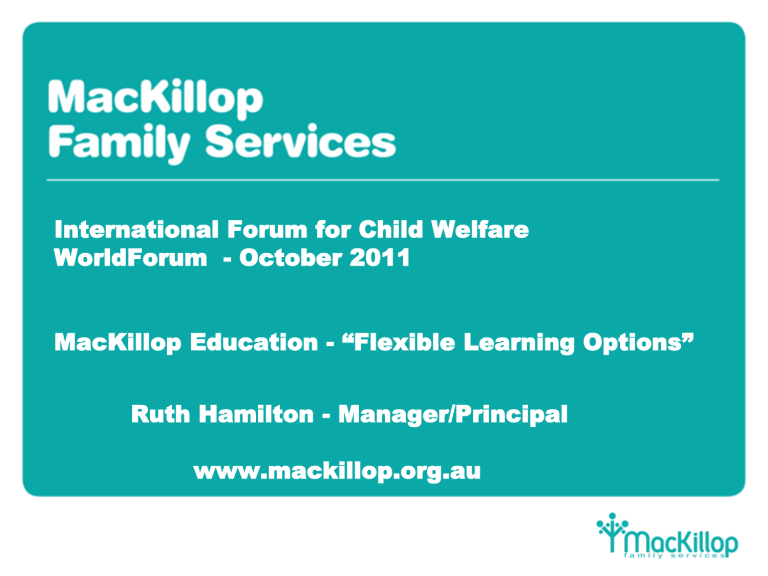
International Forum for Child Welfare
WorldForum - October 2011
MacKillop Education - “Flexible Learning Options”
Ruth Hamilton - Manager/Principal www.mackillop.org.au
Introduction.
• MacKillop Family Services is a leading provider of services for children, young people and their families in Melbourne, Geelong, Western Sydney and
Wollongong.
• Formed in 1997 as a refounding of the earlier works of The Sisters of Mercy, Sisters of St Joseph and the
Christian Brothers.
Values.
• JUSTICE - every child has a right to a quality education
• HOPE - every child has the capacity to learn
• COLLABORATION - every child needs the support of professionals and significant others if they are to develop the necessary skills and knowledge to transition to adulthood
• COMPASSION - every child deserves to be heard and given a second chance
• RESPECT - every child has the right to be heard and supported in their education by highly skilled staff who are committed to their education
Research/Benchmarks.
• “Students who do not complete Year 12 or its equivalent are more likely to become unemployed, stay unemployed for longer, have lower earnings, and over the course of their lives, accumulate less wealth, a problem that will only increase with time as employers seek a more highly skilled workforce.”
• “Children who experience trauma have lower educational outcomes, low attendance at school and lower retention than those not exposed to traumatic situations.”
• “difficulties engaging and retaining children and young people in the mainstream school system often results in compounding wide-ranging social issues and selfharming behaviour.”
Research/Benchmarks.
• “While university enrolments in Australia have more than doubled in the last two decades, students from low SES backgrounds are three times less likely to enter university than those from high SES backgrounds.”
• “In Victoria alone there are over 5000 children living in out of home care and over 24000 Australia wide.”
MacKillop Education.
• Youth “Edventure” Program
• A Specialist School
• EMU program
• CIRC – Children in Residential Care,
Geelong and The West
• Dad’s and Kids in School (DAKS)
•
The Western Education Centre
• The Western Education Support Team
•
Northern Education Support team
• The “Rock Up” Program
• “Learn Now” Project
• Melbourne / Moonee Valley School Focused Youth Services
Geelong.
Three specific programs – disengaged or at risk of disengagement
•
YEP
– Youth “Edventure” Program
• Registered Catholic Specialist School 5 - 16yrs, 32 students at any one time, full time program
•
EMU
– short term
Process:
•
Referral
• Key teacher – Assessment, Individual Education Plan, Transition Plan,
Behaviour Plan, Timetable
• Teaching and Learning Plans – reflect developmental stages
• Curriculum links
Geelong.
Key features:
• Student support group – planning process, negotiate timetable
• Flexible
•
Welfare support
• Key teacher role
•
Relationship development
• Understanding the student
•
Curriculum links
DAKS program.
• In the Western suburbs of Melbourne as a result of a survey highlighting the barriers parents/carers felt being involved in their child's education
• Homework involvement program was considered but it was not the best way to involve parents SO “Dads And their Kids” was born
• Aim to involve parents - particularly fathers and male carers
DAKS Feedback.
Parent :
• Nice to join in without being embarrassed at their perceived lack of academic success
•
Valued down to earth activities
• Enjoying being around their children
Student :
• Enjoyed having their fathers in the school
•
Expressed appreciation of the activities and having something to take home
• Enjoyed the food
School:
• Both principals enthusiastic and want to build on the success
Children in Residential Care – (CIRC).
• development and implementation of Individual Education Plan, in conjunction with other relevant workers
• co-ordination, liaison and support necessary for participation in education and training
• collate information on barriers to participation in education, obtain further assessment where necessary
• purchase services to assist child/young person to achieve potential
Challenges.
• Transitions back to mainstream
• Engagement of some young people
•
Complex case management
• Ability to plan for multiple indicators of success
•
Lack of family support structures to continue the supports implemented at school
• Access to resources to support the demands of individuals
• School’s limitations to respond to the needs of this cohort
Future Directions.
• To get better at assessing the more diverse needs
• Get better at complex case management approaches
•
Greater levels of engagement in learning
A Trauma Informed Shared Vision promoting a Collaborative Approach.
